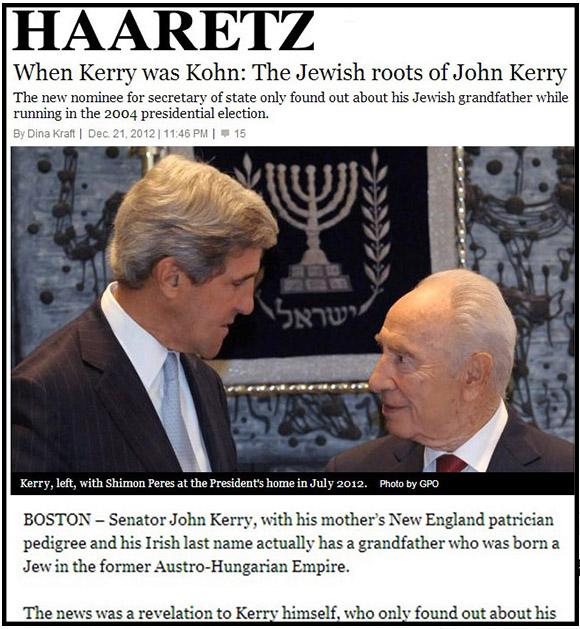US Sen. John Kerry, President Barack Obama’s anticipated nominee to
succeed Hillary Clinton as secretary of state, is a frequent visitor
to Israel, with a strong pro-Israel voting record, who last spring
assured Prime Minister Benjamin Netanyahu and President Shimon Peres
in Jerusalem that they need have “no doubt” about Obama’s
determination to prevent Iran from obtaining a nuclear weapon.
Kerry has been a staunch defender of
Obama’s stance on Iran, and last March denounced the unsuccessful
Republican presidential candidate Mitt Romney for taking overly
aggressive positions on the Iranian nuclear threat. After Romney
published an op-ed slamming Obama’s “feckless” approach, Kerry
stormed that, “Talk has consequences, and idle talk of war only
helps Iran by spooking the tight oil market and increasing the price
of the Iranian crude that pays for its nuclear program.”
The chairman of the Senate Committee on Foreign Relations, Kerry has
also been a strong critic of Israeli settlement expansion and of
Israeli restrictions on supplies going into Gaza.
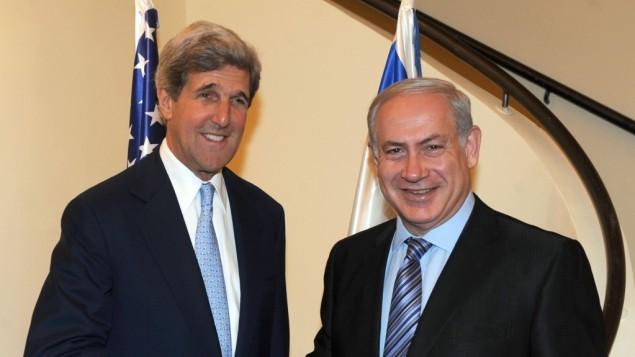 Prime Minister Benjamin Netanyahu during his meeting
with United States Senator John Kerry in Jerusalem, June, 2010.
Prime Minister Benjamin Netanyahu during his meeting
with United States Senator John Kerry in Jerusalem, June, 2010.
While he is a Catholic, two of Kerry’s
grandparents were Jewish. He found out more than 20 years ago that
his paternal grandmother was Jewish, but only learned during his
failed 2004 presidential campaign that his paternal grandfather was
also Jewish.
A genealogist hired by the Boston Globe
established that Kerry’s grandfather Frederick was born to a Jewish
family in a small town in the Czech Republic. ”This is incredible
stuff,” Kerry told the Globe. “I think it is more than interesting.
It is a revelation.”
Frederick Kerry was born as Fritz Kohn,
changed his name to Kerry in 1902, immigrated to the United States
in 1905 — and committed suicide in a Boston hotel in 1921.
Before the family learned of its Jewish
heritage, Kerry’s brother Cameron in 1983 converted to Judaism, and
married an Orthodox Jewish woman. Cameron, too, has visited Israel
and he campaigned in the Jewish community on behalf of his brother
in 2004, discussing John’s views on Israel, and appearing along with
Harvard Law School professor Alan Dershowitz, writer-comedian Larry
David, and other Jewish elected officials.
Cameron Kerry said at the time that his
brother often joined his family for Shabbat dinner, though the
senator had never come to a family Passover seder.
On his last visit to Israel last spring,
John Kerry told Peres of Obama’s determination to thwart Iran, “If I
can just say to you and to the people of Israel: I hope there is no
doubt about President Obama’s seriousness and commitment that Iran
should not have and cannot have a nuclear weapon.” He added: “The
president has made it clear that he is not talking about
containment, he is talking about prevention.”
At the Democratic Party convention last
fall, Kerry quoted Netanyahu praising the Obama administration in a
bid to show that Republicans have “lied” about the president and
Israel.
“Barack Obama promised always to stand
with Israel to tighten sanctions on Iran — and take nothing off the
table,” Kerry declared. ”Again and again, the other side has lied
about where this president stands and what this president has done.”
But, he went on, “Prime Minister Netanyahu
set the record straight — he said our two countries have ‘exactly
the same policy … our security cooperation is unprecedented’ … When
it comes to Israel, I’ll take the word of Israel’s prime minister
over Mitt Romney any day.”
On Middle East affairs, Kerry has
frequently urged rapid progress toward a two-state solution,
penalties for settlement expansion and, until the deepening of civil
war, engagement with Syria.
In 2009, not long after Obama took office,
he said in a speech that, “The Obama administration presents an
extraordinary opportunity for a new beginning where America reclaims
the role of an active and creative agent for peace.”
Addressing the Saban Center of the
Brookings Institution, he urged a direct US role in Israel-Syria
talks, and said negotiations could be nudged along by loosening
sanctions against Syria. ”Loosening certain sanctions in return for
verifiable changes in behavior could actually benefit US businesses,
and the sanctions can always be tightened again if Syria
backtracks,” he said.
On West Bank settlements, Kerry said in
the same address that US policy opposing expansion for decades has
“existed on paper alone.”
“Nothing will do more to make clear our
seriousness about turning the page than demonstrating — with actions
rather than words — that we are serious about Israel freezing
settlement activity in the West Bank,” Kerry said.
He was critical as well of Israeli
limitations on humanitarian relief into Gaza following the previous
winter’s Operation Cast Lead. Kerry was reported to have intervened
personally to allow in truckloads of pasta after Israeli bureaucrats
had determined that rice was satisfactory relief.
“I raised this with our Israeli friends,”
he said. “We need to broaden the definition of what is able to go in
as a matter of Palestinian aid.”
In the address he also said getting Iran
to end its suspected nuclear program was a priority; Hamas
participation in any process was still stringently contingent on
recognizing Israel and ending terrorism; Arab nations must play a
role in suppressing Hamas’s influence and stopping the flow of arms
into the Gaza Strip; the United States would continue to guarantee
Israel’s security.
Having just returned from a visit to the
region, Kerry said he learned in his meetings with leaders of Arab
nations that they had replaced the infamous “three noes” of the 1968
Khartoum conference, which counted out any dealings with Israel,
with three new “noes”: “No Iranian nukes, no Iranian meddling and no
Iranian hegemony.”
He also swatted down a questioner who
suggested Israel de-nuke in parallel with Iran. Kerry said the Arab
leaders with whom he met did not even mention Israel’s nuclear
capacity.

Newfound Jewish roots gave Kerry a ‘deep’ bond with Israel
Secretary of state, who only learned his grandparents were Jews in 2004, says he understands Israelis’ reluctance to sign a deal
By Raphael Ahren
February 20, 2014
US Secretary of State John Kerry says his feelings toward Israel
changed 10 years ago, after he found out that that he had Jewish
grandparents.
“It’s a connection that’s deep. I lost
a great-uncle in the Holocaust and a great-aunt. I never knew
that until then. To learn that, after years of being passionate
about ‘never again,’ with respect to the Holocaust, and then to
understand that you are biologically and personally connected to
that, is very moving,” he said in an interview aired on Thursday
by Israel’s Channel 2.
“Israel itself has a special
connection to me, not just because of that personal, now-known
connection, but more importantly because of the amazing journey
of the Jewish people,” he said in the interview, which was
conducted last Tuesday at the State Department. “And now I’ve
learned that, I have got a better sense of that.”
Kerry first found out about his Jewish
ancestry in 2004, when he was running for president against
George W. Bush. Both his father’s parents were born Jews and
converted to Christianity because of anti-Semitism, and they
changed their name from Cohen to Kerry when they immigrated to
the United States.
Asked by the interviewer, Ilana Dayan,
whether he felt that Israelis were still defined by their
tragedies to the extent that those events made them hesitant to
take the “leap of faith” necessary to withdraw from the West
Bank and agree to the establishment of a Palestinian state,
Kerry answered in the affirmative.
“But,” he added, “here is what I want
to emphasize: I think my job is to try to help create a
situation where the realities of the agreement are such that
it’s not such a leap of faith. I don’t want this to be a leap of
faith. I want this to be a leap of reason. A leap of rationality
and of choice, based on a very understandable and tangible set
of guaranties about security and other things.”
If that could be achieved, Kerry
continued, “then we take some of the emotion away… even though
it will be for some always a huge emotion, because some people
have very different views about greater Judea and Samaria — I
know all of that. But I also know that over 70 percent of the
people of Israel believe in a two-state solution.”
The secretary of state said that he
sometimes spends hours on the phone with Prime Minister Benjamin
Netanyahu and understands him. But he was hesitant to say
whether he believes Netanyahu would agree to the kind of
concessions a peace agreement would require. “If we’ve answered
all of the challenges of security for Israel, if he has secured
the nation state of Israel as the home of the Jewish people, if
he has secured recognition and secured the refugee issue —
properly dissolved — I hope he will,” Kerry said.
Netanyahu’s primary concern is the
security of Israeli civilians, Kerry stressed. “I have said this
to [Palestinian Authority] President [Mahmoud] Abbas: The
primary issue for any Israeli is to know that if they make an
agreement, they are safer and stronger because of the agreement
than they were before they made it. And that goes contrary to
past experience in pulling out of Lebanon and pulling out of
Gaza.”
Kerry hinted that settlers might not
have to relocate under the terms of a peace deal. Asked about
the personal price that a settler might have to pay when
required to leave his home as a result of an accord, Kerry
replied that he was not sure this would be necessary.
“I have no argument with anyone in
Israel who says that no deal is better than a bad deal. I say
that myself,” he said. “I’m not in the business of trying to put
together a bad deal.”
Kerry dismissed criticism of him from
right-wing Israeli politicians, particularly Defense Minister
Moshe Ya’alon, who said the top US diplomat was “messianic and
obsessive.”
“You know, those are judgments that
other people may or may not have fun making in this process. I’m
doing my job,” he said. Kerry claimed he was not insulted by
Ya’alon’s remarks. “I think I am committed, and I’m determined.”
The secretary of state declined to
comment on his gut reaction in January to Yedioth Ahronoth’s
publication of Ya’alon’s scathing criticism, which targeted the
US mediation of the peace talks between Israel and the
Palestinian Authority.
“That’s not the way I operate. I’m an
optimist and I am a believer in possibilities,” he said. “People
who know me know that when I sink my teeth into something, if I
get the bit between my teeth, I try to get it done.”
Commentaries:
When Kerry was Kohn: The Jewish roots of John Kerry
By
Dr. Patrick Slattery, David Duke Website, Dec 25, 2012
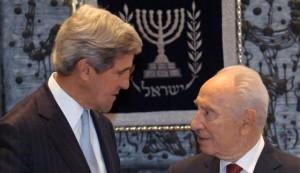 The headline is taken from a
Haaretz article (21.12.2012).
John Kerry is about to become the latest in
a string of ethnically Jewish top cabinet secretaries over the
past few decades. The list of Jewish and half-Jewish Secretaries
is printed below. It is not necessarily exhaustive, as some have
not necessarily been that forthcoming about their ancestry.
Madeline Albright would have very happily finished her career
without being identified as a Jew and reacted with surprise when
it was revealed during her tenure as Secretary of State that at
least three of her grandparents were Jewish. Keep in mind that
as a young child she fled Czechoslovakia with her family after
the Munich Pact turned the country into an effective dominion of
Hitler’s Germany. As for Kerry, he reportedly only found out
about his Jewish grandmother in 1994 and his Jewish grandfather
in 2003. Still, he has often stated that although he has an
Irish surname he never claimed to be Irish. So what did he think
he was? He has certainly been consistently Zionist. Here is the
list of positive confirmations.
The headline is taken from a
Haaretz article (21.12.2012).
John Kerry is about to become the latest in
a string of ethnically Jewish top cabinet secretaries over the
past few decades. The list of Jewish and half-Jewish Secretaries
is printed below. It is not necessarily exhaustive, as some have
not necessarily been that forthcoming about their ancestry.
Madeline Albright would have very happily finished her career
without being identified as a Jew and reacted with surprise when
it was revealed during her tenure as Secretary of State that at
least three of her grandparents were Jewish. Keep in mind that
as a young child she fled Czechoslovakia with her family after
the Munich Pact turned the country into an effective dominion of
Hitler’s Germany. As for Kerry, he reportedly only found out
about his Jewish grandmother in 1994 and his Jewish grandfather
in 2003. Still, he has often stated that although he has an
Irish surname he never claimed to be Irish. So what did he think
he was? He has certainly been consistently Zionist. Here is the
list of positive confirmations.
Secretaries of State:
Henry Kissinger
Madeline Albright
Secretries of Defense:
Caspar Weinberger
Harold Brown
William Cohen
James R. Schlesinger
Secretaries of Treasury:
Werner M. Blumenthal
Robert Rubin
Lawrence Summers
Other recent Treasury Secretaries including Bill Simon,
Henry
Paulson, and Tim Geitner have been
reported to be Jewish, although it is very difficult to get
conclusive evidence one way or the other. The long history of
crypto-Jews and the fact that being able to operate in Jewish
interests without being identified as Jewish has been an
important weapon in the Jewish arsenal makes the issue of these
individuals’ ethnicity more than just a trivial matter. Now,
here is the article about Kerry’s Jewish roots from the Times of
Israel.
Addendum by Radio Islam:
In Feb 2013 John Kerry entered the influential role as the new
U.S. Secretary of State.
“US” Secretary of
State Kerry-Cohen and Family: “We are Jews”
David Duke Website, February 21, 2014
The “American” Secretary of
State, John “Kerry” Cohen and his brother have both come out
publicly to affirm that are in fact Jews and therefore cannot be
anti-Semitic or anti-Israel, as some right wing Zionist
extremists have alleged.
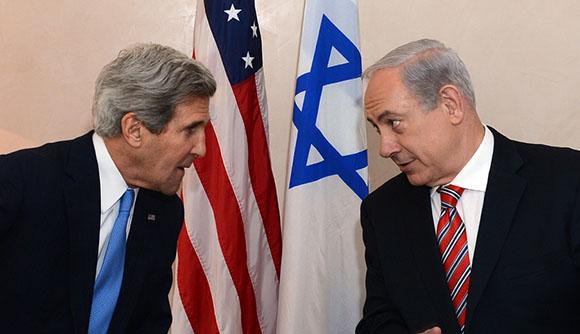
Responding to allegations by
members of Israel Prime Minister Benjamin Netanyahu’s cabinet
who accused Kerry of endorsing “anti-Semitic” efforts to impose
sanctions on Israel when he voiced concern that failure to reach
a peace accord with the Palestinians could lead to economic
boycotts, Kerry-Cohen
made his latest remarks in an interview aired on Thursday by
Israel’s Channel 2.
According to Kerry-Cohen, his
feelings toward Israel changed ten years ago, after he found out
that his family was actually Jewish.
“It’s a connection that’s deep,” he said. “Israel
itself has a special connection to me, not just because of that
personal, now-known connection, but more importantly because of
the amazing journey of the Jewish people. And now I’ve learned
that, I have got a better sense of that.”
Kerry claimed that he first
found out about his Jewish ancestry in 2004, when he was running
for president against George W. Bush.
Both his father’s parents were
born Jews and converted to Christianity because of alleged
“anti-Semitism,” and they changed their name from Cohen to Kerry
when they immigrated to the United States.
His comments were echoed by his
brother, Cameron Kerry-Cohen wrote publicly about the family’s
Jewish roots in a column
in Israel’s largest circulation daily newspaper, Yediot.
Cameron Kerry-Cohen married a
Jewish woman and he and his family are practicing Jews.
“There is no truth and no good that can come by calling into
question John Kerry’s good faith toward his own heritage,”
Cameron Kerry-Cohen concluded in his column, a
translation of which was posted on the U.S. Embassy’s Facebook
page. “Israel and the Jewish people deserve better than
that.”
It is important to understand
that the allegations against Kerry-Cohen are being made by
ultra-extremist right wing Zionists, who are upset that the more
“moderate” Zionist Supremacists want to slightly soften their
public image.
This policy shift is supported
not because it is in anyone else’s interests, but only because
they believe it best supports the racist state of Israel’s case.
In other words, this “conflict”
is only between an extreme set of people who are in dispute with
an even more extreme group—while their common ideal—Jewish
Supremacism—is never under question.
This can be seen from
Kerry-Cohen’s pronouncements on Israel, contained in the Israeli
Channel 2 broadcast.
During that show, he said that
he sometimes spends “hours on the phone with Prime Minister
Benjamin Netanyahu and understands him.”
“If
we’ve answered all of the challenges of security for Israel, if
he has secured the nation state of Israel as the home of the
Jewish people, if he has secured recognition and secured the
refugee issue — properly dissolved — I hope he will [agree to
peace],” Kerry-Cohen said, referring to Netanyahu’s
stance on peace discussions.
Note however, that the demand
for a Jews-only state is always first and foremost at the
demands of both the “moderate” and “extreme” Zionist
Supremacists—in other words, their core policy remains
identical.




























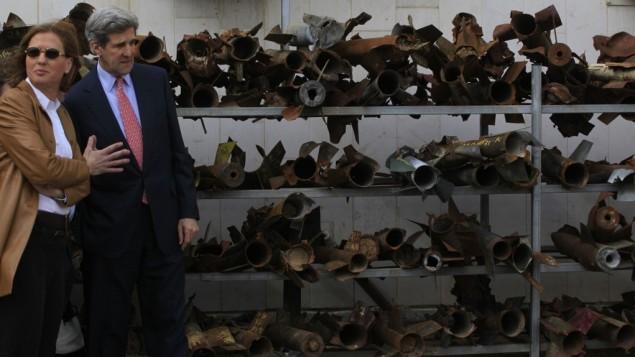

 The headline is taken from a
The headline is taken from a
